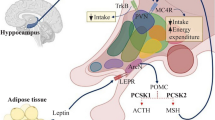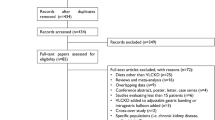Abstract
Background
Bariatric surgery is the most effective long-term treatment for morbid obesity, reducing obesity-associated comorbidities. The purpose of the present study was to evaluate the UCP3 promotor (-55C→T) polymorphism outcomes 1 year after biliopancreatic diversion in morbidly obese patients.
Methods
A sample of 40 morbidly obese patients (BMI >40 kg/m2) were operated. Weight, fat mass, blood pressure, basal glucose, triacylglycerols, total cholesterol, low-density lipoprotein cholesterol, and high-density lipoprotein cholesterol were measured at basal visit and at each visit. The frequency of patients with diabetes mellitus, hypertension, and hyperlipidemia was recorded at each visit.
Results
Twenty-eight patients (70%) had the genotype C/C (wild group) and 12 (30%) patients C/T (mutant group). In wild type group, body mass index, weight, fat mass, systolic blood pressure, glucose, total cholesterol, low-density lipoprotein cholesterol, and triacylglycerols concentrations decreased. In mutant type group, the same parameters improved, without statistical differences with wild group. Initial weight percent loss at 1 year of follow-up was similar in both genotypes (34.1% vs 28.6%; ns).
Conclusion
Polymorphism -55C/T of the UCP3 promotor did not have an effect on weight loss or clinical outcomes after bariatric surgery.
Similar content being viewed by others
References
Aranceta J, Perez Rodrigo C, Serra Majem L. Prevalencia de la obesidad en España: estudio SEEDO 97. Med clin (Barc). 1998;111:441–5.
de luis DA, Aller R, Izaola O, Pacheco D. Early clinical and surgical results of biliopancreatic diversion. Obes Surg. 2005;15:799–802.
Scopinaro N, Adami GF, Marinari GM. Biliopancreatic diversión. World J Surg. 1998;22:936–46.
Vidal Puig A, Solanes G, Grujic D, Flier J, Lowell BB. UCP3: an uncoupling protein homologue expressed preferentially and abundantly in skeletal muscle and brown adipose tissue. Biochem Biophys Res Commun. 1997;235:79–82.
Saltzman E, Roberts SB. The role of energy expenditure in energy regulation: findings from a decade research. Nutr Rev. 1995;53:209–20.
Bouchard C, Perusse L, Chagnon YC, Warden C, Ricquier D. Linkage between markers in the vicinity of uncoupling protein 2 gene and resisting metabolic rate in humans. Hum Mol Gent. 1997;6:1887–9.
Clapham J, Arch J, Chapman H. Mice overexpressing human uncoupling protein 3 in skeletal muscle are hyperphagic lean. Nature. 2000;406:415–8.
Samec S, Seydoux J, Dullo A. Role of UCP homologues in skeletal muscle and free fatty acids in obesity. Lancet. 1998;351:1933–4.
Schrauwen P, Xia Xia J, Walder K, Snitker S, Ravussin E. A novel polymorphism in the proximal UCP3 promoter region: effect on skeletal muscle. UCP3 m RNA expression and obesity in male non-diabetic Pima Indians. Int J Obes. 1999;23:1242–5.
Otabe S, Clement K, Dina C. A genetic variation in the 5′flanking region of the UCP3 is associated with body mass index in humans in interaction with physical activity. Diabetologia. 2000;43:245–9.
Meirhaeghe A, Amoyel P, Helbecque N. An uncoupling protein 3 gene polymorphism associated with a lower risk of developing type 2 diabetes and with atherogenic lipid profile in a French cohort. Diabetologia. 2000;43:1424–8.
Executive Summary of the Third Report of the National Cholesterol Education Program (NCEP) Expert Panel on Detection, Evaluation and Treatment of High Blood Cholesterol in Adults (Adult Treatment Panel III). JAMA. 2001;285:2486–7.
Standards of diabetes mellitus, American Diabetes Association. Diabetes Care. 2007;30:s4–41.
Dalgaard LT, Sorensen TIA, Drivshom T, Borch Johnsen K, Andersen T, Hansen T. A prevalent polymorphism in the promoter of the UCP3 gene and its relationship to body mass index and long term body weight change in the Danish population. J Clin Endoc Metab. 2001;86:1398–402.
Alonso A, Marti A, Corbalan MS, Martinez Gonzalez MA, Forga L, Martinez JA. Association of UCP3 gene -55CT polymorphism and obesity in a Spanish population. Ann Nutr Metab. 2005;49:183–8.
Liu YJ, Liu PY, Long J, Lu Y, Elze L, Recker RR, Deng HW. Linkage and association analyses of the UCP3 gene with obesity phenotypes in Caucasian families. Physiol Genomics. 2005;22:197–203.
Kral JG, Branson R, Piec G. Melanocortin-4 receptor gene variants affect results of gastric banding. J Gastrointest Surg. 2004;126 Suppl 2:A774.
Kral JG, Lentes KU, Horber FF. Binge eating as a phenotype of melanocortin 4 receptor gene mutations. N Engl J Med. 2003;349:606–9.
Sesti G, Perego L, Cardellini M, Andreozzi F, Ricasoli C, Vedani P, et al. Impact of common polymorphisms in candidate genes for insulin resistance and obesity on weight loss of morbidly obese subjects after laparoscopic adjustable gastric banding and hypocaloric diet. J Clin Endoc Metab. 2005;90:5064–9.
Poitou C, Lacorte JM, Coupaye M, Bertaris S, Bedel JF, Lafon N, et al. Relationship between single nucleotide polymorphisms in leptin, IL6 and adiponectin genes and their circulating product in morbidly obese subjects before and after gastric banding surgery. Obes Surg. 2005;15:11–23.
de Luis DA, Gonzalez Sagrado M, Conde R, Aller R, Izaola O. Lack of association of the -55C/T polymorphism of UCP3 gene with fat distribution in obese patients. Ann Nutr Metab. 2007;51:374–8.
Author information
Authors and Affiliations
Corresponding author
Rights and permissions
About this article
Cite this article
de Luis, D.A., Pacheco, D., Aller, R. et al. Influence of -55CT Polymorphism of UCP3 Gene on Surgical Results of Biliopancreatic Diversion. OBES SURG 20, 895–899 (2010). https://doi.org/10.1007/s11695-008-9510-2
Received:
Accepted:
Published:
Issue Date:
DOI: https://doi.org/10.1007/s11695-008-9510-2




